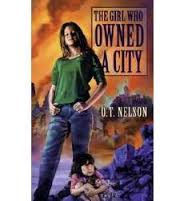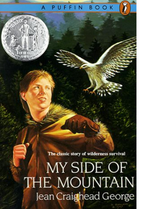
A lot of outcasts feel like they need to escape their own troubled lives, and take hold of the runaway stories completely, thinking that, in a world like that, they might survive, because gathering food and finding shelter seems like an easier life than trying to explain how your brain works to other kids. Those of us longing to escape read books like Julie of the Wolves, (where a girl chooses to run with wolves instead of people), Number the Stars, (A popular children’s book about the Holocaust), and other runaway stories.
Loners tend to linger in shadows, sometimes with a book or headphones. I imagine this happens more and more with younger kids now, but when I was in elementary school, no one had an IPOD. We carried either a CD Walkman or some bulky MP3 player. But I didn’t have one; so books became my escape, and later writing would take me out of dire situations and into imagined ones instead.
I began writing my own runaway story, “The High School from Hell”:
Most of the lockers were opened with bags and stuff squeezed in so tightly the lockers couldn’t stay shut. I started to walk down the gum-chewed hallway, with sweat pouring down my face.
I finally found the office. All of the desks were painted green, and the paint was pealing on most of them. “Excuse me, could I help you with something? Aren’t you supposed to be in class right now.” Asked the lady behind the front desk.
It sounded more like a threat than a question; I turned to go but came back. “Excuse me” she said this time even ruder, “what do you want?”
-The High School from Hell
It is about a girl who runs away from her home with a guy she falls in love with, until he starts beating her, and she eventually leaves him to live by herself in an abandoned shack for weeks or months. Finally, I became bored with leaving her to her own devices, and brought some characters along to move in with her and cause havoc. Even the person I invented couldn’t live in complete solitude.
I began writing that story on my mother’s computer at home; I worked on it every day for the first two weeks of summer, before I was enrolled at the YWCA summer camp for girls, and by the time summer camp started, I had typed 50 or so pages of a story that I wished was real. The other girls at the Y all wanted to read it—they were drawn because I seemed to be so into the story, focus unwavering. So I read parts of it to them. I joined them in dancing and karaoke and playing house, and for once I didn’t feel the need to escape. Maybe it was because there were no boys around to compete with.
The YWCA was situated downtown, right next to Lawrence High, infamous for gang violence and the required use of metal detectors. We were living in a city where parents had to worry that their girls might not make it through high school (or junior high) without getting pregnant or otherwise maimed. The prevalence of male violence was clear everywhere we looked. And when the girls were violent, we blamed that on the guys too—cheating or daddy issues. We were victims. But here, surrounded by other girls, we could be who we were without needing to weigh gender on a constant basis.


 RSS Feed
RSS Feed
